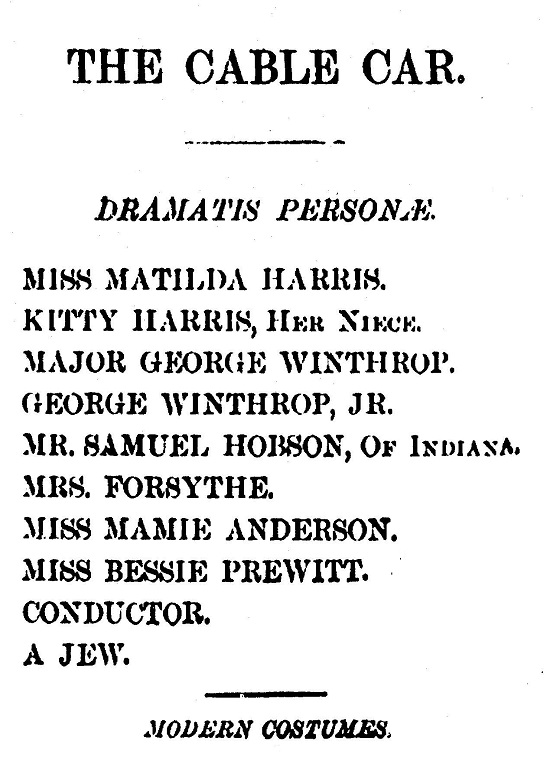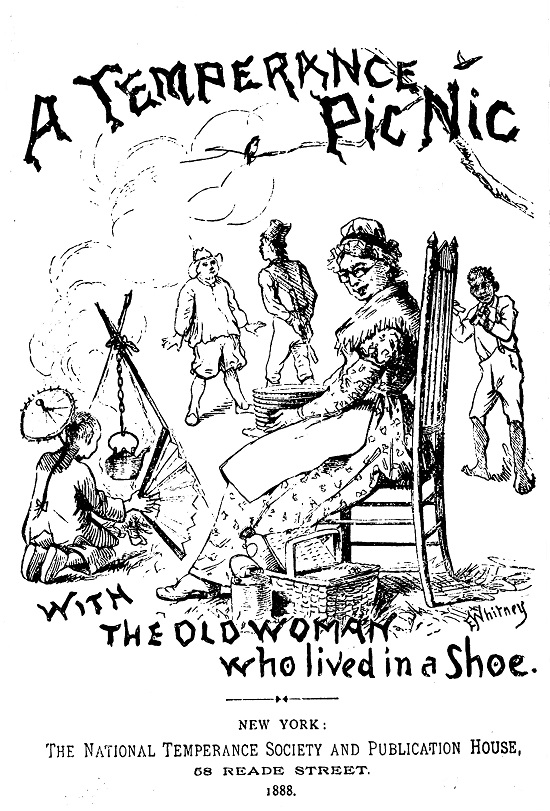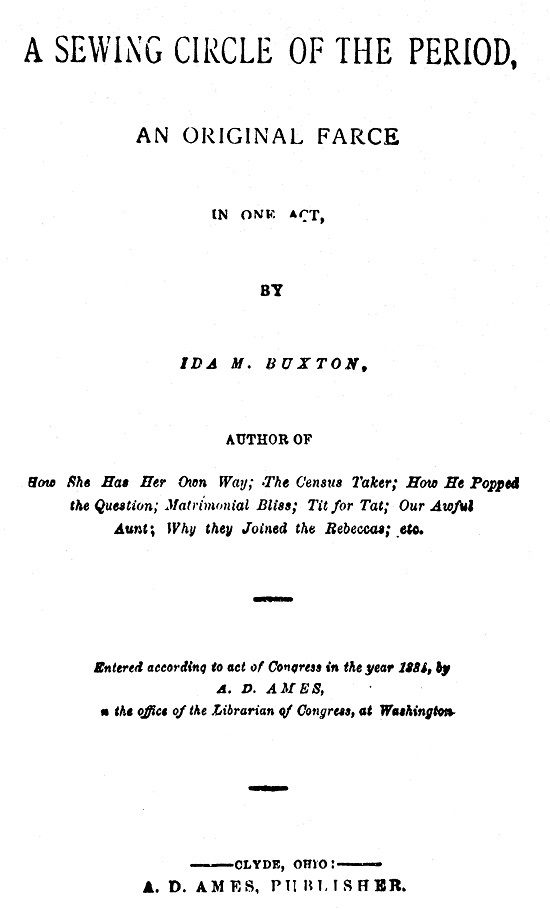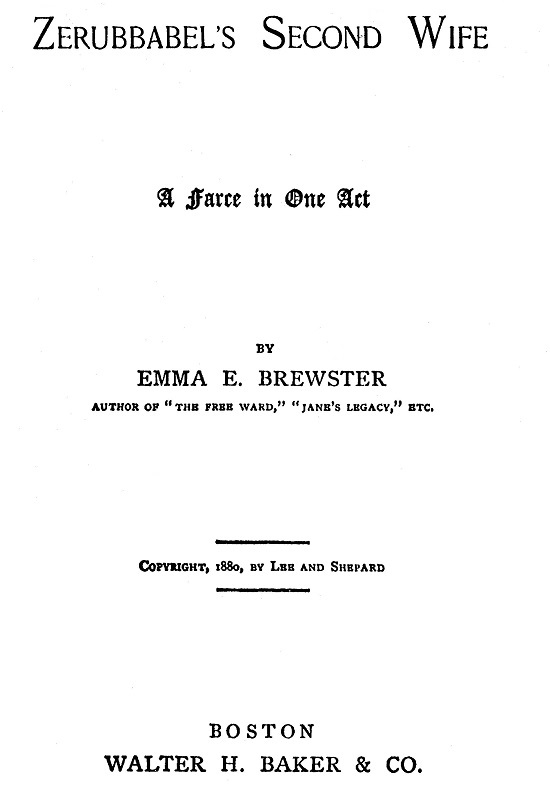Female Playwrights in Nineteenth-Century American Drama: Works by Clara Harriet Sherwood, Nellie H. Bradley, and More Than 100 Other Women Dramatists
Among the playwrights in Nineteenth-Century American Drama there are scores of women. The genres of their plays are as varied as those of their male counterparts, although more of the works for children and classrooms are by women. Many of the temperance plays are by women which is not surprising given the prominent role of women in the temperance movement. Some of the women were prolific. Still, it is more difficult to find biographical information about many of the female playwrights.
Little seems to be recorded about the life of Clara Harriet Sherwood, author of three plays included in this digital collection. These three plays all signal an acute social awareness and a ready wit. As with many other women dramatists, Sherwood is concerned with the social nuances of courtship.

Farces depend on several circumstances including mistaken identity, putting the wrong letter in the wrong envelope, mistaken conclusions based on inadequate information, and physical comedy. Courtship often plays a central aspect in the misunderstandings and misdirection that arise. In “The Early Bird,” Mr. Carlos Culbertson has just returned from the West and is determined to reignite his romance with Gertrude Warren upon whom he has paid a visit. She is hosting a soirée at her home and has engaged Miss Bird to arrive early and assist her.
Culbertson presses Miss Warren to declare her love, but she puts him off repeatedly referring to his sense of humor. Indeed, he has written her a passionate note including the assertion: “I positively laid awake in church last Sunday morning, concocting schemes by which I might catch a glimpse of you.” Nevertheless, he perseveres.
He arrives an hour early for a promised tête-à-tête with his love object. Miss Bird intrudes and soon Mr. Van Rensalaer Brown comes to woo Miss Bird. Brown is a familiar character, an anglophile who affects the upper-class affectation of pronouncing many of his “rs” as “ws.” A case in point: Howace Gweely. Culbertson mistakenly assumes that Brown is wooing Miss Warren. Miss Bird is mistaken concerning Mr. Brown’s intentions and reproves Miss Warren roundly. Finally, the fog clears, mistakes are righted, and it appears that the wooing of Miss Warren and Miss Bird is back on track for the besotted couples.

In “The Alumni Play,” also by Clara Harriet Sherwood, Bessie Noble and Ethel Ordway meet to plan the theatrical offering they are planning for the entertainment of the new graduates of their school. Ethel has a strange idea:
But wait—Afterwards the bridal party partake of a delicious repast; the groom rises to his feet (dramatically) and proposes a toast to—to—let me see—to the Differentiation of the Homogeneous, or something equally comprehensible—to which the bride responds with whole pages diligently culled from Herbert Spencer. It is a feast of reason and a flow of soul.
The difficulty that arises when it is made clear that there will be no men in the cast is not easily resolved. All of girls refuse to dress in male clothing because “they are afraid of criticism.”
Ethel promises to play a male role if they can find a play that suits her concept of portraying a male. Subsequently, Bessie’s brother Jack is introduced, and it evolves that he is interested in Ethel. Misapprehensions are raised about one Jane Owens which lead to confusion. She has given a ring to Jack which he resolves to return to her.
After much more business and talking at cross purposes, Ethel and Jack are able to declare their love for one another. Still, as the curtain drops, the task of creating a graduation play looms before them.

Many plays by women are concerned with affairs both domestic and amorous. In “The Cable Car,” the third play by Sherwood, she fumbles with affairs of the heart all while her characters travel on a cable car. The playwright has seen fit to include a character identified as “A Jew” only to have him falsely accused of the theft of an umbrella and then to disappear. This seems to be a gratuitous embellishment by an author rather casually unmindful of her bias.
Mrs. F. and Mrs. H. are traveling on the cable car and enjoying a slanderous gossip as they make their way.
Miss H. …but let Kitty marry a Winthrop? Never!
Mrs. F. He seems to be a nice enough young fellow.
Miss H. (Scornfully.) O, nice enough perhaps—but like father, like son, I say. The Winthrops were always a faithless, deceitful, hard hearted set, and none of my family shall have anything to do with them. (Drops her umbrella. The Jew picks it up and gives it to her.)
Sherwood seems to delight in exposing the self-centered concerns of her lady passengers.
Miss H. (In a high voice.) How noisy these cars are.
Mrs. F. Yes, aren’t they? But speaking of getting a seat—why the other evening I came up from down town rather late, and the car was filled with workmen. Common working men, most of them, and I had to stand nearly the entire way.
Miss H. Shocking!
Mrs. F. Yes, and Kitty said she supposed they were tired. Tired! Imagine it! Those great strong men—when I had been shopping all afternoon.
Miss H. (With a sigh.) O! I suppose the day will come when women will get up to give men their seats.
There ensues some confusion about the umbrella which is mistakenly returned to Mr. Hobson by a somewhat nervous passenger who, in his agitation, does not realize it is not his. Meanwhile, Miss H. obsesses about her cousin Sam Hobson (who has, unrecognized, just left the cable car with the umbrella.)
But what was I saying about relatives? O yes—Why cousin Sam Hobson, from Indiana, will arrive some time to-day, and I must find out about the trains, for he could never find his way in the world. He hasn’t been here for twenty years—and you know what Indiana farmers are. But I can’t get over Mrs. Anderson. Stop here, conductor! (Waving her hand – looking around.) But where is my umbrella? Jane, have you my umbrella?
Mrs. F. No indeed. You had it right there by you.
Miss H. Why it’s gone!
Mrs. H. Jane, I see it all. That abominable, detestable Jew has taken it. He sat next to me. He and he alone could he alone could have taken it.
Thus, the racial calumny continues. The ladies gossip contentedly unaware that the subject of much of their conjecture, the Major, is seated within hearing distance. Despite the gratuitous antisemitism, the ladies chatter on blithely. Mistaken identities are discovered, romances are resolved, and all ends well.

Nellie H. Bradley was a prominent temperance advocate who wrote essays and plays meant to instruct young people in the virtue of abstinence. In “Temperance Work in Sabbath-Schools” is her essay entitled “The Work Among the Young.” She extols the glory of the present age wherein all children are receiving an education that includes physical culture “thus securing the equal development of body and mind.” She praises the elevation of temperance in young people’s education:
But, of all the forces set in motion by philanthropic and Christian effort in behalf of the rising generation, that which is most beneficent in its influence, most far-reaching in its results, is the one which holds aloft the glowing beacon of Holy Writ and kindles the blazing watchfires of science along the highways and byways, to warn the young against the seductive snares and dangerous pitfalls laid for their souls by the twin demons, Alcohol and Tobacco.
This is but a snippet from Bradley’s essay. The whole is a high-flown jeremiad against the perverse influence of alcohol on society. Her plays evidence the same ardor and are particularly aimed at young people. Those found in Nineteenth-Century American Drama include A Temperance Picnic: With the Old Woman Who Lived in a Shoe; The First Glass, or, The Power of Woman’s Influence and The Young Teetotaler or Saved at Last; Marry No Man If He Drinks, or, Laura’s Plan and How It Succeeded; Reclaimed, or, The Danger of Moderate Drinking; The Stumbling Block: Why a Deacon Gave Up His Wine; and Wine as a Medicine, or, Abbie’s Experience.

It was not unusual for women dramatists to write plays for all-female casts. Among those was Ida M. Buxton. She was sympathetic to the Suffragette Movement and a prolific playwright. Several of her many plays in this collection have all-female casts, including A Sewing Circle of the Period. At curtain rise we discover several of the ladies gossiping about absent members of the sewing circle while protesting that they, unlike one of the absentees, never stoop to gossip. As they espy other local ladies walking down the street they make such comments as:
Mrs. A. (looking toward the window) Who is this coming down street? Do look quick! Mrs. Vincent, with a bran [sic] new silk dress! Did you ever! Such extravagance, and her husband heels over head in debt!
Mrs. N. I declare its [sic] abominable! What airs she puts on! One would think she descended from a line of kings.
Mrs. S. I wonder where she is going.
Mrs. B. To Mrs. Fountaine’s of course, haven’t you heard?
Mrs. A. Heard what?
Mrs. B. The scandal that’s all over town. Why, I thought everybody knew it.
Mrs. A. Scandal! Why no indeed, do tell us.
Other snippets of their conversation:
Mrs. B. O, Miss Chase, I must admire your new suit; where did you purchase the material? It is lovely.
Miss C. Father brought it from New York; it is very expensive.
Mrs. A. (aside to Mrs. B.) They’d better pay their grocery bills instead of buying expensive goods.
Miss C. Doubtless you’ve heard that Frank Paine and Rosa Lee are to be married next week?
Mrs. N. Well I never! You don’t mean to say that pert little minx has actually entrapped a man!
The ladies chatter away contentedly as they eviscerate others. Finally, Mrs. B. and Mrs. N. prepare to leave.
Mrs. B. (aside) This has been the dullest circle I ever attended.
Mrs. N. (aside) I agree with you, you won’t catch me to come hear [sic] again.
The remaining ladies examine the work that was abandoned by the departed expressing their disdain for the shoddy work. They soon depart leaving Mrs. A. alone.
Mrs. A. Well, there, I am glad they are gone! Such a set indeed! If it were not my bounden duty as a church member, you may be sure I would never have the circle meet at my house.
Other plays by Buxton include Taking the Census; Matrimonial Bliss: A Scene from Real Life; Tit for Tat; Why They Joined the Rebeccas; Our Awful Aunt; Carnival of Days and others.

Like The Sewing Circle described above, Why They Joined the Rebeccas also calls for an all-female cast. The Rebeccas are four women affiliated through their husbands with the Order of Odd Fellows. The organization’s pledge is “To live peaceably, do good unto all, as we have opportunity and especially to obey the Golden Rule, Whatsoever ye would that others should do unto you, do ye even so unto them.”
This cast consists of Mrs. Dean, Mrs. Kent, Mrs. Barnes, and Mrs. Gray. They all share a common grievance arising from their husbands’ fraternal demands. To wit: while there is never money enough for the wives’ fancies, there is always enough for their husbands to purchase new and extravagant regalia for their lodge meetings. As Mrs. D. says:
He can’t be worse than Mr. Dean, I’m sure; with him Monday it’s lodge, Wednesday the Encampment and a degree for every other night in the week. If he’d put a few more degrees into the house I’d like it, but no, that can’t be done; the girls have wanted a new piano for a year, but couldn’t have it because their father must needs flaunt about in royal purple.
Additional grievances are offered, and a new one emerges.
Mrs. G. I think the Odd Fellows must be a very sickly organization, there’s always two or three dozen who demand fraternal aid and my husband does enjoy sitting up with the sick people and getting home about three o’clock in the morning.
Mrs. B. Last week Mr. Barnes besides attending the regular meeting, took two degrees and watched three nights with sick brothers, and when I asked for money to buy the children some shoes, he had given it to aid a suffering brother.
Mrs. G. I don’t care how much he attends to sick brothers, but when he came home with his shoulders covered with yellow hair a yard long, and in his pocket a daintily perfumed handkerchief marked with feminine initials, then I resolved to hunt up the affair.
Mrs. D. That isn’t any worse than Mr. Dean; his hobby used to be Odd Fellow’s widows and children, although I think the children came in for a pretty small share of the attention; he said he was a special committee to attend to them, but after he visited Widow Downes three times in one week, I appointed myself a special committee to investigate the affair, and since then he has lost all fondness for widows.
Consequently, the ladies resolve to join the Rebeccas in order to get the goods on their husbands. As the curtain falls they are donning their bonnets in preparation for storming the gates with the promise that if they succeed they will publish a pamphlet entitled “WHY THEY JOINED THE REBECCAS.”

Other plays with all-female casts by women include “A Wonderful Cure” by Katherine Lacy, “An Afternoon Rehearsal” by Lizzie Margaret Knapp, and “Murder Will Out” by Lizzie May Elwyn. Among the many plays by Emma E. Brewster in this digital collection are Aunt Mehetible’s Scientific Experiment; Eliza’s Bona-Fide Offer, and How the Colonel Proposed. Another is Zerubbabel’s Second Wife. Its three characters are Miss Matilda Wiggins; Peggy, “Miss Wiggins’ near-sighted maid-of-all-work”; and Deacon Zerubbabel Scrubber. As the play opens, Miss Wiggins enters, adjusts her glasses, and peers out the window.
Miss W. That’s the fish man, I’ll be bound. A baker, a butcher, and a fish man, all there in one day! and they’ve bought something of every one. Well, some folks never seem to have any bottom to their pockets! There are Nancy and Jane both out to the cart. Well, some folks never seem to know what to do with their time! I should think there’d be enough to do in that great house of a morning to keep all the girls at work. Do see them laugh! They haven’t much manners to stand gossiping and giggling with a fish man that way!
The hapless Peggy enters and begins a dodgy dance of bumping into and tripping over most of the items in the room. Miss Wiggins asks Peggy to go over to the neighbors and ascertain exactly what they are buying. Peggy returns to announce they have bought “eels, ma’am!—and oysters.”
Miss W. Eels and oysters both, Peggy? Think for one moment what you are saying. Eels and oysters both? Remember that the reputation of your neighbors is at stake. Eels and oysters both, Peggy?
P. [bumping against a table.] Oh, that’s the table! Yes, ma’am! Eels and oysters both. I’d say it if ‘t was the last word I ever spoke before the breath left this mortal frame. Eels, mum, and oysters.
Miss Wiggins marvels at her neighbor’s spending, certain they cannot afford it and worrying about the Mr. Green (the neighbor) and his being played a capricious tune by his wastrel wife. She is of the opinion that “Abel might have done better, Peggy.”
Soon, Deacon Zerubbabel Scrubber appears on Miss Wiggin’s doorstep. She frets. “Fifteen times Zerubbabel has asked me to marry him, and I’ve said no,—thinking I’d get a better offer. But if he asks me now, I’ll say yes. I don’t think there’s much use in waiting any longer.” As it turns out, the Deacon is at least as deaf as Peggy is near-sighted.
Miss W. Let me take your hat, deacon.
Dea. [blowing his nose]. Yes, pretty well, pretty well.
Miss W. Take a chair, deacon.
Dea. Only so-so. Uh, uh! I’m troubled with brown creatures.
Miss W. Brown creatures?
Dea. [coughs]. Uh, uh! Brown-kitties.
Miss W. [screaming]. Brown kitties? Cats?
Dea. Oh, the cat’s all safe. Guess I’ll sit down. [Sits.] Yes’m, the cat’s all safe. Gentlest creetur you ever see.
Miss Wiggins pours her solicitous offerings to provide comfort for the Deacon while significantly implying what a good wife she would be. But the Deacon compares her favorably to his second wife which news drops on Miss Wiggins very heavily indeed. In further tortured conversation appears to say this wife has left which refreshes Miss Wiggins assault. Alas, when the maiden lady throws herself at the Deacon, he reveals that his second wife is not dead as supposed, but merely away.
Miss W. Well, but, Zerubbabel, you said that she was dead.
Dea. What?
Miss W. [louder]. Your second wife has gone, you say.
Dea. Yes, gone to Titicut, but she’ll be back Saturday night, I s’pose. [Miss W. screams and sinks into chair, covering her face with her hands.] Thunderation! Ain’t that too bad, now?
We have barely skimmed the surface of this subject. Women played a large role in providing theatrical entertainment in the 19th century, and more than 100 plays by women are found in this database. Their contributions were often as worthy as their male counterparts, but their recognition did not achieve the same level as many of the men.
For more information about making Nineteenth-Century American Drama available at your library, please contact Readex Marketing.



